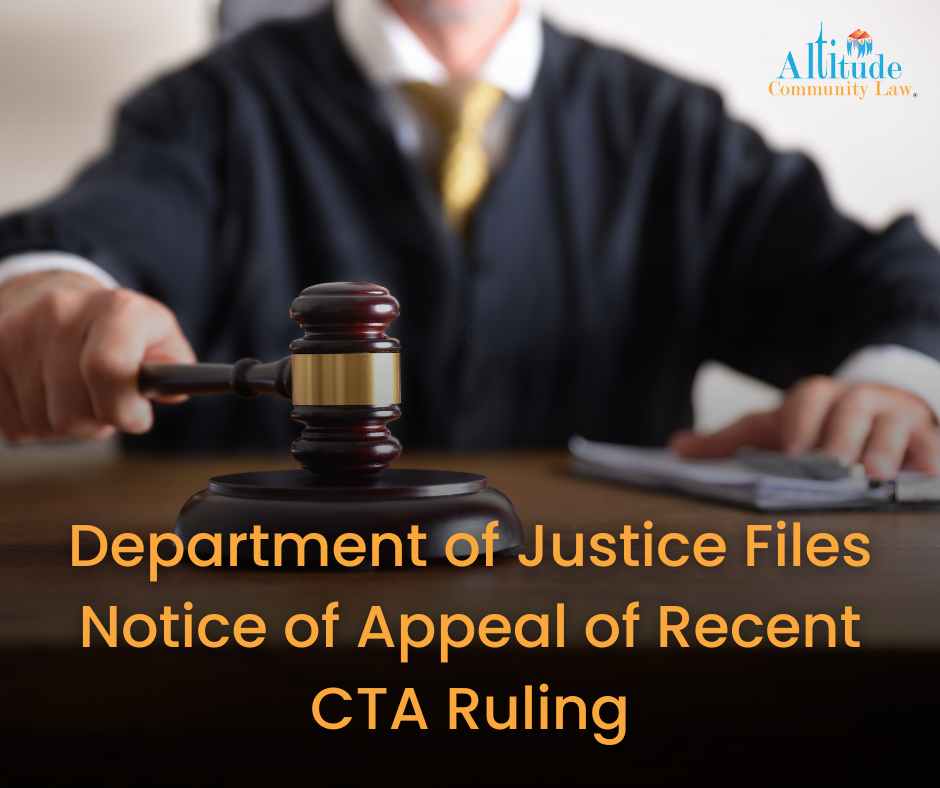
As I’m sure you’ve already heard by now, on Tuesday December 3rd the U.S. District Court for the Eastern District of Texas issued a nationwide preliminary injunction in the case of Texas Top Cop Shop, Inc. et al. vs. Garland. That Court determined that the CTA reporting requirements are likely unconstitutional and granted a preliminary injunction that blocks the Financial Crimes Enforcement Network (“FinCEN”) from enforcing the CTA requirements.
The ruling has nationwide application and applies to all corporations, including community associations. This would be great news for associations if the ruling was, actually, upheld. However, as we predicted in our recent eblast, the Department of Justice has filed a notice of appeal. This may result in a stay of the injunction, which could mean that associations must still comply with the CTA and file the Beneficial Ownership Information (“BOI”) report by January 1, 2025.
This is a complicated matter and still unresolved. But boards need to make a choice:
Option 1: Continue with CTA compliance and file the BOI report by January 1, 2025, until and unless a final judgment or further developments occur concerning the preliminary injunction issued in the case above. We continue to recommend this approach as the most prudent approach.
Option 2: Choose not to comply with the CTA under the current ruling. If your association chooses not to comply with the CTA, certain risks are involved. Specifically, if the injunction is lifted, then your association will still have to comply with the CTA, including the challenging deadline of filing the BOI report by January 1, 2025.
As a reminder, Altitude Community Law will continue to act as a third-party service provider in filing BOI reports for associations. However, please note we will stop accepting signed CTA Fee Agreements on 12/15/24. For more information on our CTA service, please see our CTA information page or email [email protected] with your questions.
Hello! I am not certain how the CTA affects HOA’s…. As a former Board member of Silver Valley Homeowners Association, we are bound to disclose all financial and other information. Thank you for informing me how this benefits us. I must have mis-understood the act…
thanks so much
Katie Christianson
Hi Katie – Thank you for reaching out. The CTA applies to domestic reporting companies and because an Association is created by the filing of a document with the Colorado Secretary of State, it is considered a domestic reporting company. The CTA requires that a Beneficial Ownership Report be filed by the individuals who directly or indirectly control a company. For an Association, those individuals would be the members of the Board or an Owner who owns 25% or more of the Units or Lots in the Community. While the CTA does not require the reporting of financial information on the Beneficial Ownership Report, it does require the following: The name, address and date of birth of the individual and an ID number from an in acceptable identification document (such as a non-expired US Driver License or non-expired US Passport, for example).
I am a loyal follower of the Altitude Community Law blog. However, I have a concern about associations voluntarily reporting the requested information to comply with FCTA in light of the ruling in The Texas Top Cop Shop, et. al. v. Garland. Practically, if the injunction were lifted in the next 22 days it would be shocking if FinCEN would enforce compliance for a majority of the 350,000 community associations and their board members for the failure to comply. Forcing compliance for failure to support the intent of the FCTA to avoid Terrorism or Money Laundering is ludicrous.
The bigger issue that I see is the requirement to report to FinCEN what amounts to “Personally Identifiable Information.” I could be a cynic, but I find little comfort in the position of FinCEN that their system will not be hacked and the personally identifiable information will be taken putting board members at risk. This is a concern, because a very slight minority of associations have Cyber Liability/Data Breach Coverage. Moreover, I do not have great confidence that FinCEN or the IRS will indemnify any associations for the consequences of their PII being stolen.
I also do not believe that a failure to comply by January 1, 2025 will result in the board members from being imprisoned.
The following is a list of information that board members need to report. These all fall within the definition of Personally Identifiable Information:
1. Legal Name
2. DOB
3. Residential Address
4. Copy of acceptable ID which can be any of the following: Drivers License, State ID or Passport.
We can certainly understand your concerns regarding reporting this information pursuant to the Corporate Transparency Act. As of the time of this writing, FinCen has opted to place a hold on the requirement to report, pending the government’s appeal of the most recent Court decision regarding the CTA. However, a Board may still wish to report this information voluntarily at this time in order to avoid the “mad rush” that will certainly come if the appellate Court overturns this most recent Court decision. Ultimately, it is up to the Board as to whether it wishes to wait and see or whether it wishes to attempt to get ahead of the game at this time. We are of the opinion that the CTA reporting requirement will be reinstated and that litigation regarding such reporting will likely go on for a number of years before a more permanent resolution will be found.